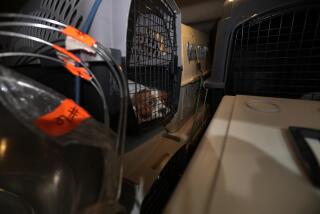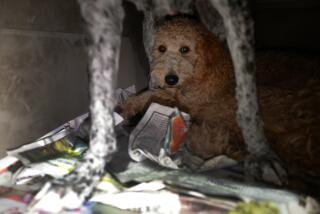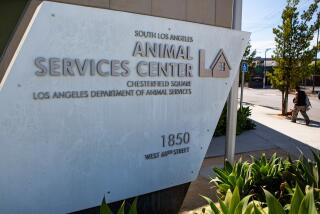Tails Wag Over End of British Quarantine
LONDON — When U.S. diplomat Michael Murphy looks at Fred, the 6-year-old basset hound he brought to London from Washington more than a year ago, he sees a member of the family, a “stubborn but friendly” dog he likes to take to the pub.
Yet to British eyes, Fred -- and pets like him -- was a waddling Trojan horse of disease, threatening their island nation with rabies. For the past century, U.S.-born dogs have had to endure six months in quarantine before being admitted to Britain, a regulation that has always put a mild strain on an otherwise brotherly transatlantic relationship.
Fred’s second-class status is about to end. On Wednesday, the British government introduced legislation to rescind the quarantine requirement for U.S. and Canadian cats and dogs, a measure expected to take effect Dec. 11.
It was victory won on the back of an eight-year-long campaign by London-based pet owners and North American diplomats, joined by some of the Atlantic-hopping celebrity aristocracy -- from actress Elizabeth Hurley to pop singer Elton John -- who complained that they couldn’t take their pets with them when they traveled between continents.
“We could not have done it without a bit of glitz from the Liz Hurleys, but we also had improvements in medical science on our side,” said Mary Fretwell, the driving force behind the Passport for Pets lobby group -- an unusual alliance of cat people and dog people.
The wife of a former British ambassador to France, Fretwell set up the organization after her own basset hound, Bertie, died in the 1980s after a spell in quarantine.
On Wednesday, she celebrated with champagne at the London residence of U.S. Ambassador William Farish, where British Animal Health Minister Elliot Morley announced the relaxation of the pet import rules in a room filled with people telling their own sad stories of pets left behind.
U.S. business executives, government officials and academics have long complained that the quarantine was a deterrent to taking a job in Britain. Those pet owners who did accept postings often spent traumatic weekends visiting their cats and dogs held in solitary confinement at government-approved kennels.
The quarantine will now be lifted, said Morley -- a cat owner himself -- provided the pets have a microchip inserted under their skin and are vaccinated for rabies at a recognized veterinary clinic before entering Britain. This Pet Travel Scheme, or PETS, will provide the animal with its own electronic and documented “passport.”
The pets would also have to travel in and out of Britain on an approved air carrier.
Dropping the restrictions required a huge psychological readjustment for the British. Great pet lovers themselves, they have used the strict quarantine to successfully shield themselves from rabies, the potentially fatal viral infection that attacks the central nervous system.
Fretwell recalls her first meeting eight years ago with the senior British civil servant in charge of the quarantine policy, who told her: “I have seen ministers come and go over this, and I will see you go too.”
The quarantine could not be bent or waived -- not for CEOs or soldiers, ambassadors or even the blind.
Many saw the policy as draconian: It affected an estimated quarter of a million Americans living in Britain. Former U.S. Ambassador Raymond Seitz, who put some of his own dogs through the process, said separating people from their pets for six months was “ludicrous, awful and dreadful.”
The policy also gave rise to an illegal underground of pet smuggling. For a few thousand dollars, rogue boat owners would offer to sneak pets into the country across the Channel from France.
Yet it was the opening of the Channel Tunnel that helped change British attitudes. While the “Chunnel” was being built in the 1980s and ‘90s, there were loudly expressed fears that rabid animals would use the new route to get into Britain.
The threat never materialized. So restrictions on cats and dogs started to come off, first in February 2000, when dogs and cats were allowed in from Western Europe under the PETS program, and then 11 months later, when an additional 28 countries from Australia to Japan were added to the list. This change allowed Americans to launder their pets through friends or “foster” owners in Europe -- as the Murphys did with Fred -- rather than go the quarantine route.
Directly bringing pets from the United States and Canada still required quarantine because of the presence of rabies in North American wildlife. Only after two scientific studies described the risk of North American pets bringing rabies to Britain as extremely low did the government feel confident enough to drop the restriction.
American pets will still need to spend their first two or three nights in holding kennels while their paperwork is checked. Heathrow Airport is already installing extra kennels in anticipation of the added demand.
More to Read
Sign up for Essential California
The most important California stories and recommendations in your inbox every morning.
You may occasionally receive promotional content from the Los Angeles Times.










